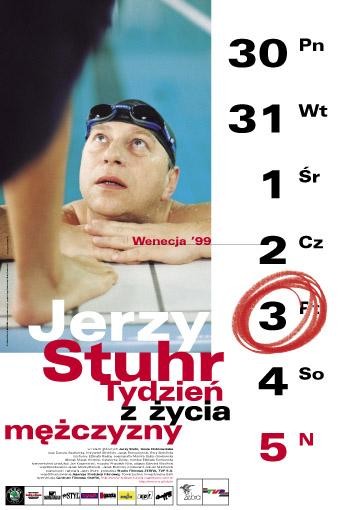
A WEEK IN THE LIFE OF A MAN
Poland, 1999, 90 minutes, Colour.
Jerzy Stuhr, Gosia Dobrowolska.
Directed by Jerzy Stuhr
A Week in the Life of a Man is an excellent portrait of a man in mid-life, responsibilities, decisions, failures. It was written and directed by Jerzy Stuhr (Three Colours White) and his own film, A Love Story). He is excellent in the film, keeping audience interest despite his not being a glamorous screen presence. His wife is played by Gosia Dobrawolska who made films in Australia for 15 years, including Silver City and many Paul Cox films. This is her first film back in Poland.
The film is structured in seven days and shows a lawyer at work, with his wife, the charities and his writing, interviews, his breaking off a sexual relationship, his choir practice, his helping a friend with a mental breakdown. The film weaves all these incidents together to give a profound insight into this ordinary man.
It is his singing in the choir, the work being an opera from Hamlet in his soliloquy about "what a wonderful piece of work is man, noble amongst animals..." While there is an ironic comment on the behaviour of the lawyer, the film ultimately comes together with an interview about why he sings: "When I sing, I have hope."
1.The quality of the film? Writing, acting, direction? The work of the writer-director and his performance?
2.The Polish city in the '90s, the well-to-do couple, the post-Communist era, homes, apartments? The law courts? Institutions? The media? The streets? The church?
3.The importance of the musical score, the chorale work, the rehearsals each day, the final performance and its meaning for his life?
4.The opera itself, the quotation from Hamlet, man the masterpiece above the animals? Its ironies with Adam and his failures, sinning? Yet his confession, penance, asked why he sings - "When I sing, I have hope"?
5.The structure of the film, specifying the seven days, Adam beginning his day swimming and his comment on the previous day and how he feels? The mixture of the various aspects of his life, maintaining interest and empathy?
6.Adam, his name, in himself, age, position? His love for his wife, their not having children? The girlfriend, financially supporting her, the guilty meetings at the hotel, the break-up? His financial situation, selling the apartment, buying the house? His mother in hospital, decisions about her health, transplants? The law and his severity as a prosecutor? His book on ethics and his donation to the charity? How typical a man of the '90s? The professional man?
7.Adam and his relationships: his love for his wife, being with her for so long, supporting her in her award (though worried about the money)? The selling of the apartment, the buying of the house? Her foundation and its financial difficulties? His own donation and the discussion about tax deductions? His accepting of Dominik and his deafness, bringing him home, caring for him and liking him? The separation from the girlfriend, the confrontation in the hotel room, asking for her sympathy, not giving her any, her taunt of his being old - and his going back into the room and seeing her weeping? His personal tensions, truth and lies? The interviews, the girls interviewing him at the swimming pool, their wanting to frame him, the set-up for rape, his anger and smashing the camera, the bold personally? The revelation of his sexuality and his desires? The final trying to get the money back from the people and discovering why they were selling their house, their son and his blind daughter? His wanting the money for his mother and his wife? Adam revealed in his relationships?
8.Adam in court, the man smuggling the computers, the harsh judgment (and the comeuppance with the women trying to frame him)? The pathos of the girl leaving her baby in the toilet - and the information that she made sure that the cleaner would actually find the baby? His going to the scene of the crime with the accused and analysing evidence? His skill in the courts? His tendency to give speeches and the judge overruling him?
9.Finance and taxes, deals, the dangers of many deals, the Communist society wanting to help his wife out with the failing foundation? His anti-Communist stance? Wanting to get the money back for his mother and the demands that such a transplant for her would make?
10.His relationship with his mother, going to see her, putting her in the hospital, not telling her the truth about her condition, singing the music to her?
11.The choir, the conductor, the range of people? His sick friend and his talking during the practice, Adam talking to his psychiatrist, the trip, wanting to help him? And the irony of the sick man finally singing - with hope - in the church?
12.The interviews, his book, stances on ethics, personal inconsistencies? His going to confession, his penance? Confessing each week?
13.A cross-section of incidents in the mid-life of a professional man: relationships, love, career, decisions, errors - and hopes?